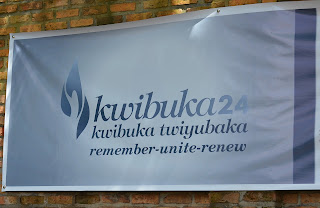'Courage' is deliberately used here; the essence of courage is undertaking an overwhelming difficulty or pain, driven by a cause worthy of the struggle. Rwanda's national animal, the leopard, signifies ferocity, the Great Watcher and courage. The country is all this for sure.
 |
| Squeaky clean streets in Kigali |
It must be tiresome for Rwandans to have their tourist industry zoomed in on the inky blackness of their darkest hour; centuries of culture and life overshadowed by 100 days. Yet with calm and graceful patience, the horror is quietly acknowledged and spoken of. "There is more to Rwanda than genocide and gorillas!" exclaimed a Western aid worker. She is right, but first, the elephant in the room has to be confronted and passed.
During our 48-hour visit, we continually asked the same question of ourselves and other tourists. "How did Rwandans manage to move forward and reach this platform of quiet serenity, law and order?" Our eventual theory was that the nation was so broken and destroyed, they willingly followed a strong leadership determined to rebond and rebuild. Traumatised and exhausted, they placed their faith and trust in a government that had fought and shed blood to end the holocaust.
 |
| Signs like this abound in Kigali |
Still, on a visceral level, when the machetes and clubs stopped swinging and gunfire died down, what possessed the terrified Tutsis to trust enough to emerge from hiding? How did the Hutu find the courage to stop turning their faces away from the slaughter around them, or to put their pangas down and to re-assimilate themselves into a semblance of society and community? There is a leap of faith there that beggars my understanding.
This was neighbour against neighbour. Godparents handed over their godchildren, priests their parishioners, families their in-laws, patients their doctors, teachers their students to be massacred. The cat's cradle of close connections was tightly knotted; it's completely inexplicable that the bonds of love, respect and friendship could be dissolved so harshly. How does a nation put that behind them to reknit those relationships?
Ranulph Fiennes' The Secret Hunters is the best explanation of how a genocide can happen within a nation that I've ever read. A clever play on human nature is all it takes. First, you isolate Group B, refer to them as vermin (rats, cockroaches) to diminish their humanity. Tell Group A how they are superior and all the woes they suffer (or imagine they suffer) can be laid at the door of Group B. Then you insert slivers of fear into Group A - it is their duty to inform on / report their neighbours. Dire consequences for their own families await those in Group A who don't prove their loyalty to the state. Stage set, let the action begin.
Somehow, the little country in the heart of Africa stopped its own genocide. Then it began to rebuild and repair. A huge part of this surely lies in the Kigali Genocide Memorial, a no-holds-barred unravelling of the slaughter centuries before it actually began. Six years after the genocide, Kigali City Council began to build the shell of this memorial. Only six years! Such emotional maturity is staggering.
The Campaign Against Genocide museum provides a detailed plan of the Rwandan Patriotic Front's campaign to halt the madness. While told with some understandable jingoistic braggadocio, the end result is undeniable. This clean, safe, orderly, united, proud and thriving nation is a shining beacon of healing and forgiveness to Africa and the world.
 |
| Patriotic fervour in the campaign memorial - soldiers protect babies (the future), fallen comrades, women (mothers of the nation) all the while staring far ahead into the future. |
There is a somewhat Disneylandish feel to the eerily clean and law-abiding city which seems to be run along the lines of a military camp with unquestioned precision. Perhaps this stern paternalistic rule helped the rebuilding process; citizens meekly followed and obeyed, terrified by what they and their neighbours were capable of and only too happy to be directed into line.
 |
| Solar powered advertising on street litter recycling bins |
Whatever the mix of ingredients in the Rwandan cake, you will frequently hear "There are no more Hutu or Tutsi, we are all Rwandan." Ethnicity has bowed out to proud nationalism. Viva.
Rwanda today is a wonderful place to visit and next time, we'll leave the city and tour the lakes and hills. Meanwhile, we urge you to support Rwanda whenever you can. Gorilla trekking? Coffee? Flying anywhere? Go Rwanda! Not just because they are a small country with few natural resources to offer the world, but because WE need to hold this African story close at heart and support its success. The deaths of one million people have produced possible solutions to many issues confronting other countries as well, If only our politicians and soapbox shriekers would listen.
Meanwhile, why not follow https://www.facebook.com/RwandaTheHeartOfAfrica/? Incredible photographs of this magnificent country mingle with inspiring stories about the day to day business and happenings. It's my feel-good read when News24 has me throwing my phone across the room!
No comments:
Post a Comment